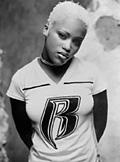I had checked off “percussion” when Ms. Weiskopf handed out the thin slip of paper that listed our sixth-grade band options.
Various Artists
Schoolhouse Funk (Cali-Tex/Quannum)
I liked drums, and I wanted to be in charge of rhythm, keeping the beat. Of course, Scott Jacobi got drums—he had asthma and was medically prevented from playing instruments that, you know, required breathing. That left me with my lower choices, the brass. The rock kids all took clarinet and flute and sax and oboe and anything that trilled quick enough to be confused with a guitar solo. But I didn’t want anything thin. In order, after “percussion,” I’d listed “French horn,” “trumpet,” and “trombone”: instruments with fat, laborious, blaring tones. Of course, my predilection for the obese sounds must have struck Ms. Weiskopf as strange, so much so that she shuffled my name right to the geographical rear of the band, where the thickest heads reign. If there’d been a tuba, I’d have probably gotten that, but instead, I was blessed with the baritone horn, a sort of mini-tuba that was easily the school band’s bastard nephew. So unwieldy was this instrument’s sound that it even came in a visually onomatopoeic case: a black, contoured plastic barrel of a tub that took up a whole seat on the school bus when I brought the damn thing home for practice.
Once I got home though, I’d lug the horn into the living room and start blurting out hideous tones in front of the television. The thumps were percussive in and of themselves, like the plodding march of a red-faced, drunk fat guy. The rhythm wasn’t inherent so much as implied. I didn’t know how to play songs yet, just notes, but my grandma would always compliment their girth, nodding politely and grinning with thin teeth.
But after a couple of weeks of dirty after-school looks, I’d had all the convincing I needed to put in for a change. I didn’t duck the funk, though. Lucky Mike Kobrin had just bought his own trumpet and was abandoning the trombone. I slid in like Wally Backman. The trombone wasn’t quite so robust as the bari; its burps had an intrinsic abruptness, unless you used the slide, which would turn a weak-lipped player into sonic drip and a skilled one into Grover Mitchell. In the beginning, if you don’t vary your wind stream the right way while you’re dragging the slide, not only is the sound fuzzy, but you’re likely to jump or drop an octave. Even later on when I’d graduated to the high school band, moved up from “Hot Cross Buns” to “Aida,” I’d still slip that octave every now and again.
See, imperfection was part of the instrument, not to mention a part of the players. Especially in the back row—baritones, trombones, and poor Frank Lee on tuba (high school had more instruments)—personalities were a strange mix: thugs, geeks, quiet kids. Politely put, folks from the other side.
Down South, the brass was more mainstream, but no less eccentric. On Schoolhouse Funk, a DJ Shadow-curated compilation of local youth brass band music, you can practically hear the toothy grins of the kids behind their horns and drums. Most of the tracks are covers—War, James Brown, Freddie Hubbard, Funkadelic. But how they compare to the originals—the results range from dead-on to better to nice try—is incidental. More excitingly, what we’ve got here are rookies. The tracks are culled largely from talent show souvenir LPs, pressed up and sold to parents to celebrate their young ‘uns’ performance extravaganza. Consequently, there’s a lot of enthusiasm bubbling behind these notes. On “Thing Medley/I Made a Mistake,” the horn blasts are so wide they’re almost arrhythmic. Meanwhile, “KCOR Variations” offers precise and menacing notes, as if the players were out to prove themselves through emphasis. War gets double cover treatment, with “Cisco Kid” and “The World Is a Ghetto” knocking up against each other. “Loose Booty” isn’t quite as Funkadelic as its progenitor, but it wiggles in accordance with the setting and time. After all, these are school affairs.
The academic funk is beginning to work its way into hip-hop as well, particularly in the South, where the rich institution of school bands captured on Schoolhouse Funk is complemented by a robust tradition of college marching bands. Not a single Southwestern Athletic Conference football game can pass without a halftime show thick with organized noise. Master P has clumsily slapped the big band sound into some of the No Limit catalog, most recently on Mr. Marcelo’s “How You Like It.” Most excitingly, Trick Daddy imported the Florida A&M marching band to lay the music for the hook to his last single, “Shut Up.” Those rolling, bumpy baritones and trombones remind me of what I knew instinctively back in junior high as I was creating my own schoolhouse funk: Rock and roll could never ever hip-hop like this.








